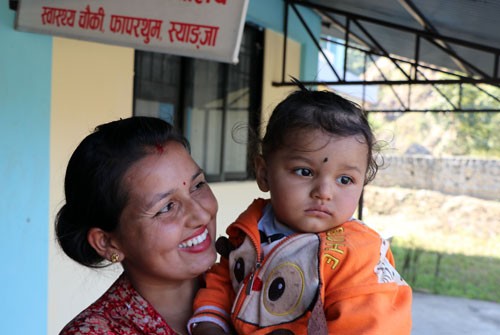The Nepal Health Sector Support Programme 3 (NHSSP 3) was designed to support the goals of the National Health Sector Strategy (NHSS 2015 – 2020). It was focused on enhancing the capacity of the Ministry of Health and Population (MoHP) to build a resilient health system to provide quality health services for all. NHSSP 3 was funded by UK Aid from the UK government and was implemented from April 2017 to December 2022.
HERD INTERNATIONAL was one of the four core partners of the programme. The programme included two components. The first component was General Technical Assistance to increase the capacity of the Ministry of Health to improve health policy-making and planning, procurement and financial management, health services, and the use of evidence for planning and management. The second component aimed to increase the Ministry of Health’s capacity to retrofit health infrastructure to withstand future earthquakes.
The programme worked on five streams:
- Health Policy and Planning (HPP)
- Procurement and Public Financial Management (PPFM)
- Service Delivery (SD)
- Evidence and Accountability (E&A)
- Health Infrastructure (HI)
Learning Lab Approach
As a member of the consortium, HERD International supported the MoHP by implementing Learning Lab (LL) approach during the time when country was transitioning from unitary to a federal systems of governance. The LL approach was conceptualized to contribute in generating a consolidated understanding of successes and challenges during the early phase of federalism. Learnings generated from the LL sites was crucial resources for the MoHP to make rational decisions and in the development of policy and regulatory frameworks, standards and guidelines. The overall objective of LL was to strengthen the local health system for improved delivery of health services in the federalized context with following specific objectives:
- Facilitate Local Governments (LG) to use a locally appropriate framework and tools to enhance capacity for the improved delivery of quality basic health services
- Enhance the capacity of LG to design and implement evidence-based policies, strategies and interventions with mainstreaming gender equality and social inclusion
- Facilitate the monitoring of progress, document lessons learned and consolidate interventions to inform scale up.
Taking into account the local context, the LL approach focused in identifying issues that may facilitate or hinder health service delivery at the local level and feed into the decision making at the respective level. Implementation was initiated in 2018 with the provision of embedded Technical Assistance in seven local levels spread across each of seven provinces and was later expanded to cover 38 local governments.
Resources
Leadership and Governance (L&G)
Coverage and Quality Assurance (C&Q)
Data for Decision Making (D4D)
Associated Team Members
Ghanshyam Gautam
Lead - Health Economics, Systems and Social ProtectionGhanshyam Gautam
Lead - Health Economics, Systems and Social ProtectionAppointed as the lead of Strategy, Partnership and Business Department Dr. Ghanshyam Gautam is a Health Economist possessing more than 20 years of experience in health policy and systems reform, social protection, evidence-based planning and capacity development. His key areas of expertise include policy and strategic reform, health systems strengthening, health financing and universal health coverage, social protection, system and policy research. He currently holds the position of Lead- Health Economics, Systems and Social Protection at HERD International and has [...]
Learn moreBishnu Prasad Dulal
Lead- Information System and Population ServiceAppointed as the lead of MEL and Data Analytics Department Mr. Bishnu Prasad Dulal is an experienced Health Information System expert, Data Analysis and Research Design specialist with 18 years of experience. With a master’s degree in Population Studies from Tribhuvan University, Mr. Dulal brings knowledge and skills to the field of health information systems and research. His expertise lies in the areas of health information system strengthening, public health research, monitoring and evaluation, proposal writing, data management and analysis, [...]
Learn moreSubash Kumar Bhattarai
Lead - Health Infrastructure and PolicyMr. Subash Kumar Bhattarai has an impressive background in civil engineering, construction management, and public administration. His academic journey includes a diverse range of qualifications, from a bachelor’s in civil engineering to a post graduate diploma in environment and sustainable development to a master’s in construction management and master’s in public administration. Additionally, he is currently pursuing an LLB in Law. Subash has actively engaged in professional development through various courses and certifications, including programs on public procurement, FIDIC conditions [...]
Learn moreSushil Chandra Baral
Managing DirectorDr. Sushil Chandra Baral is an experienced health and development expert with over 25 years of experience in research and development. Specializing in health systems, health policy, and planning at both national and international levels, Dr. Baral has played a pivotal role in communicable disease control, specifically Tuberculosis. He serves as a Managing Director at HERD International. In the past, he worked as a Strategic Advisor for the Nepal Health Sector Support Programme demonstrating expertise in program-based operational research and [...]
Learn moreUddhab Poudel
Consultant - Senior Engineer/Urban PlannerPersonal Bio Long-term associated in the development of infrastructure and Building projects in Nepal. More than 20 years of professional experience especially in the field of civil engineering, monitoring and construction supervision which includes overseeing and facilitating the smooth implementation of related jobs. For smooth implementation communication among different project in the field and producing reports on the progress, outstanding issues and recommendations for creating synergies and multiplier effects. Has leadership skills for planning and evaluation with available data for [...]
Learn moreLaxman Rayamajhi
Consultant- Senior EngineerPersonal Bio Mr. Laxman Rayamajhi was employed with HERD International as Site Engineer for Bhaktapur Hospital Retrofitting Project and was seconded to the Ministry of Health as part of the National Health Sector Support Programme (NHSSP). He has over seven years of experience in engineering field and has worked in both governmental and private organization which has helped him to adapt and work efficiently in every work environment. Work undertaken that best illustrates capability to handle tasks assigned Department of [...]
Learn moreSudip KC
Consultant - Senior Structural EngineerEr. Sudip KC is currently employed with HERD International as is Structural Engineer(Health Infrastructure) and is seconded to the Ministry of Health as part of the National Health Sector Support Programme (NHSSP).
Learn morePratistha Dhakal
Research OfficerPratistha Dhakal is a committed public health professional and registered nurse, bringing over two years of clinical nursing experience and more than two and a half years of expertise in public health. She has contributed to strengthening health systems through her work at Nepal Health Sector Support Program-III and now leverages her extensive experience in her current role as a Research Officer at HERD International. She brings a diverse perspective of system thinking, gender, clinical practice and community development into [...]
Learn more







